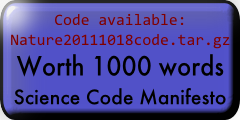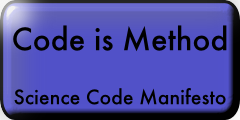The Science Code Manifesto

Last week, we learned about the publication of the
by Nick Barnes
It eloquently states one of the principles
that we have been living by at Kitware
for more than a decade, and that defines
our institutional purpose:
“Software is a cornerstone of science.
Without software,
twenty-first century science would be impossible.
Without better software,
science cannot progress.”
The manifesto also points out one of the major challenges
that we confront on a daily basis, as we work to create better
software and software practices for the scientific and academic
communities:
“But the culture and institutions of science
have not yet adjusted to this reality.”
Most of these institutions live in denial, and participate in the
scientific discours as if software was not an essential tool for it.
We see papers published in Journals every month, for which we
know that 90% of the work involved software development, and
yet software is not mentioned in the paper, or much less, the
software is not made available as part of the publication.
Very few researches develop their code by following sound software
engineering practices, such as revision control, unit testing, clear
licensing, generous documentation, readability and maintainability.
This disconnection between the practical reality of scientific research
and the way its results are presented to the larger public, is an
obstruction to the rapid progress of scientific research.
We also see funding agencies disregarding the fundamental
role that sound practices of software engineering play in the
daily activities of scientific research. Fortunately, some agencies,
for example, The US National Library of Medicine, have a more
progressive and sound understanding of the importance of
software as an indispensable research tool.
The Science Code Manifesto, rightfully goes on
saying how we can change these institutions:
“We need to reform them to address this challenge,
by adopting these five principles:”
- Code
- All source code written specifically to process data
for a published paper must be available to the
reviewers and readers of the paper. - Copyright
- The copyright ownership and license of any
released source code must be clearly stated. - Citation
- Researchers who use or adapt science source code
in their research must credit the code’s creators in
resulting publications. - Credit
- Software contributions must be included in systems
of scientific assessment, credit, and recognition. - Curation
- Source code must remain available, linked to related
materials, for the useful lifetime of the publication. -
Nick Barnes explains how one of the elements that
brought him to these principles was the influence of
Free and Open Source Software.
http://sciencecodemanifesto.org/about
Eric Raymond said it nicely more than a decade ago:
“Open Source is the application of the Scientific Method
to the process of Software Development”.
It is now time for Open Source to bring back to Science
the pragmatic practices of reproducibility and real peer
review that have been the hallmark of science since the
days of Galileo.
The Manifesto has already been endorsed
by 463 signatories:
http://sciencecodemanifesto.org/endorse
be the next one to sign !!
Make you mark and help restore dignity and
honesty in the daily practice of scientific research.

